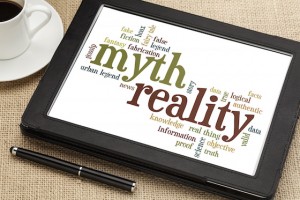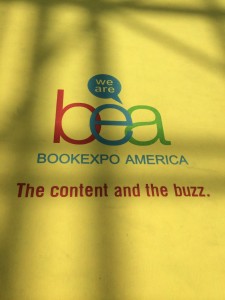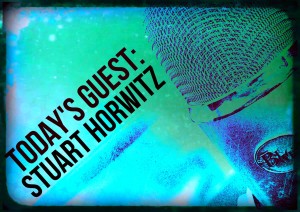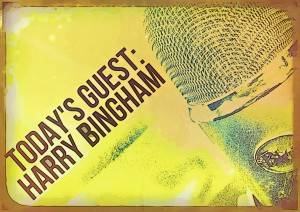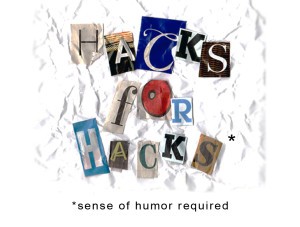Marketing
If you’re thinking of hiring a publicist, one of the first questions you’re likely to ask is:
“Do you have good contacts?”
Authors ask me this every day. While it would be easy for me to say, “Of course!” (and to add with a glint in my eye, “if you just sign on this dotted line,you’ll see…”) it would be misleading. Not because I don’t have contacts. Rather, because the very notion that contacts will lead to media placements is a great big myth it’s time to dispel.
Think about it. Our press corps is immense. Far beyond book reviewers, there are bloggers and producers and editors and staff writers covering every topic under the sun from food and travel to fashion, psychology, money, health and gardening — even adhesives. Seriously. My Vocus media database boasts an archive of 1.6 million media contacts and growing.
Like most PR pros, my work, too, spans a wide range of topics. I’ve promoted everything from business books to crime novels and literary fiction. While publicizing Alden Jones’ dazzling travel memoir The Blind Masseuse, I reached out to reporters covering travel and specific Latin American countries. For Lisa Borders’ literary novel The Fifty First State set in southern New Jersey, I was in touch with — you’ve got it — the South Jersey press. (Yes, there is such a thing.) While working on Ashley Warner’s rape memoir The Year After I dug up names of reporters who focus on women’s health. I also figured out who happened to be producing news about the college campus sexual assault stories that were making headlines at the time. The list goes on and on.
Can anybody possibly know all these contacts? Absolutely not. That’s what databases are for. Besides, the media is notorious for high turnover. A great contact who’s here today could very well be gone the next.
Instead, what a good publicist knows is how to find the news angle in any given book or project. Because the single most important factor in garnering coverage is the story itself. Reporters, reviewers, bloggers, producers and news editors are all looking for specific types of news stories presented in fairly specific ways. Mining those stories from each given book and each author’s personal history
Read MoreThe publishing world was a curious mix of hyperactivity and near-total silence last week, which can mean only one thing: Book Expo America, known as BEA. It’s an absolutely immense industry-only tradeshow and the largest publishing event in the U.S. by far, with roughly 20,000 publishing industry professionals in attendance.
If you didn’t go, you might feel left out. But never fear! Here’s everything you would have learned if you’d gone.
If you’re an aspiring author, there’s pretty much no reason to go. Here I can’t say it any better than power agent and tell-it-like-it-is internet presence Janet Reid in a recent post on her blog:
BEA is NOT a place for writers to meet agents or try to get info on getting published. Yes, I’ll be there. So will everyone from my office. I’m not there to meet you. I’m there to see what publishers are doing. I’m there to meet with my co-agents from far flung lands. I’m there to get a sense of the sea changes in the industry… You want to go to WRITER’S CONFERENCES, not trade shows. Go where agents ARE actively looking to talk to you.
Boom! Aren’t you glad you didn’t go? Cross it off your list.
Read MoreWarning: Hacks for Hacks tips may have harmful side effects on your writing career, and should not be used by minors, adults, writers, poets, scribes, scriveners, journalists, or anybody.
They say book tours don’t sell books. In fact, they can actually cost authors a lot of money. So why bother? Well, you’re making connections with readers and building your brand and a bunch of other slick-sounding, unquantifiable marketing-speak. If you want to be a big-shot author, you need to act the part, and that means taking your show on the road. Think of a book tour as a tax-write-off-able vacation where people tell you how awesome you are every night. Plus, you have a few days away from your family and those brats of yours, so you can hear yourself think for once. For that kind of payoff, you can’t afford not to go. Here’s everything you need to know to book your own book tour.
Six Months Prior to Tour
Five Months Prior to Tour
[pullquote]Sure, library patrons love books. What they don’t love is paying for books. You’re far too busy for those moochers.[/pullquote]
It turns out that all you need to do is write a great book. That’s right, you can skip social media, bookstore events, publicity, giveaways, and other complicated marketing plans. All you need to do is write a great book.
Then wait.
Wait for an agent to find you. Oh, so I suppose you will want to send out a query letter. I mean, that’s okay, right? So you have to write a great book, then send out query letters.
Then the agent will find a great publisher for you! I mean, chances are, in that process the agent or an editor may ask for changes to the book, to help ensure that it meets the needs of that partner – the publisher. So all you have to do is write a great book, send query letters, and make edits to your great book based on the needs of other partners.
Then the publisher will ensure your book gets published and shared with readers! But of course, you’re wise to negotiate that contract really well. Your agent is absolutely a key partner in this process, but let’s face it, every small decision may be fraught with a sense of ‘do or die’ because after all, you wrote this amazing book! Film rights? You want those, don’t you? So all you have to do is write a great book, send query letters, make edits based on your partners’ input, and negotiate a contract.
It is happening – your book is being readied for publication! Your publisher has taken the reins to guarantee this book gets out in to the world! Wait, they want to go right to paperback? They chose a cover you aren’t sure about? There is yet another round of edits? You are beginning to get nervous about what the marketing plan is? You wonder which bookstores it may be in?
Lots of questions, right? And of course, this is a partnership, likely with many others involved Not just your editor, but designers, marketers, the sales team, and so many others. So all you have to do is write a great book, send query letters, make edits based on your partners’ input, negotiate a contract, and be a team player in all aspects of publishing a book.
Read MoreToday’s treat at WU has two faces—I wouldn’t be able to show you their hands, because they are typing too fast. Welcome to Johnny B. Truant and Sean Platt of Sterling and Stone, the wide website umbrella that houses their “story studio” of fiction imprints, blogs and podcast. Together, along with their other partner David Wright, they have produced an astonishing array of novels and stories over the past few years, averaging over a million and a half words a year. And popular words, from looking at their Amazon pages. Their genres run the gamut from westerns, horror, fantasy, and thrillers to children’s books. (And naughty stuff too, for large children.)
Their 2014 Write, Publish, Repeat self-publishing guide has hundreds of positive reviews; I’m one of the happy readers that regards it highly. Today we’ll discuss with Sean and Johnny how they work as writing collaborators, their remarkable productivity, and how they promote their work. And whether Sean will open up a winery. From now on I’m going to sit under their keyboards and just catch the discards—should be worth at least three novels.
Jumping right in, you call your main site, the Sterling and Stone site, a “story studio.” Will you explain that for the Writer Unboxed audience in terms of your imprints and the fact that you guys write in various genres, from horror, fantasy, to even children’s stuff.
Read MoreHow do you best create? How do you best write, collaborate, increase the quality of your work, improve your ability to focus, or increase the quantity of output?
What actions are you taking to build a body of work that is both meaningful, and powered by a sense of momentum?
Each of you will have your own approach to these things. Your unique goals, preferences, and boundaries. Some will seek to publish a book a year; others won’t be able to see past their eight-year process to complete a debut novel. Both are, of course, fine.
I bring this topic up because I find that many people have blind spots as to why they make the decisions they do. Their creative process becomes mired in bad habits rooted in deep emotions that they are barely aware of. Hours, days, and even years are spent in a state of confusion or frustration regarding how to write better, how to best publish, how to best develop a readership and encourage sales. Each of these, in its own way, is a creative process. Each filled with its own emotional complexity.
How we develop the skills to master our own capabilities around each is a core part of mastering our own unique creative processes.
For instance, I am always surprised that I was taught accounting in high school, but the topic of “emotions and money” was never addressed in accounting class. How, for the most part, our relationship and decisions around money are HIGHLY subjective, based on emotional reactions objective decision-making. Further, these decisions are filled with internal narratives born of desire and fear, not out of practical financial formula.
We read an article about how awesome Apple is and the article includes a chart demonstrating how well Apple stock has done in the past few years. The result? We buy Apple stock. Suddenly, we glean aspects of their identity and success as our own. We feel this is a sound financial investment because of it. Yet, this decision-making approach involved zero financial analysis, and instead was purely emotional. We saw an innovative, successful company and felt innovative and successful ourselves by purchasing shares. If the stock tanked, we would feel betrayed, perhaps blindsided. But as it succeeds, we feel that their identity becomes our own.
The same can be true for our own creative processes.
In working with hundreds of writers and creative professionals, I have seen this play out in countless ways. Often a blockage is only identified as a symptom: “I’m overwhelmed,” or “I’m having writer’s block,” or “I’m just frustrated with all that is asked of me.” While I 100% empathize with these very important emotions, I always want to break them down to understand the root cause. In doing so, we identify assumptions being made, and challenge them in order to find a path forward.
Read MoreUnboxeders, I hope you’ll join me today in welcoming retired Navy Commander Rick Campbell to Writer Unboxed for a brief interview about his writing.
For more than twenty-five years, as we slept on pillow-topped queen-sized mattresses, he claimed a rack aboard one of four nuclear submarines, working to keep us safe. On his last submarine, he was one of the two men whose permission was required to launch the submarine’s nuclear warhead-tipped missiles.
He finished his career with tours in the Pentagon and in the Washington Navy Yard. Upon retirement from the Navy, Rick tried his hand at writing and was offered an initial two-book deal from Macmillan / St. Martin’s Press. (Since expanded to another two-book deal.)
His first novel, The Trident Deception, was hailed by Booklist as “The best submarine novel since Tom Clancy’s classic – The Hunt for Red October”.
Rick’s second novel, Empire Rising, is due out Feb. 24th and critical praise has been equally profuse. Publishers Weekly said of it: “Another riveting military action thriller by Rick Campbell. A MUST READ for fans of this genre.” And Booklist? “The story rockets around the globe and the pages cannot turn fast enough. Readers who miss Clancy will devour Campbell.”
Here’s the blurb for Empire Rising as described by Barnes & Noble:
Very much in the spirit of Jack Ryan, Campbell has crafted a tightly plotted and horrifyingly believable story in which China, desperate for access to oil in a near-future where supplies are running low, declares war and reveals itself to be much better prepared than anyone expected. After a military disaster that sends the United States reeling and leaves the Chinese free to act, a trio of well-written characters work to snatch victory from the jaws of defeat. Combining thrilling espionage-style adventures, detailed naval battles, and incredible SEAL Team missions, Campbell has created what might be the perfect military thriller.
Rick lives with his wife and three children in the greater Washington, D.C. area. You can find him at his website and on his Facebook page.
Jan: Welcome, Rick! To begin with, shall we establish the interview ground rules? Given your background as a college wrestler and your impressive military career, if my questioning gets out of line, do I need to be concerned for my safety or ability to travel?
Rick: Only if you’re flying over the Atlantic or Pacific Oceans. :)
The Trident Deception and Empire Rising are the first military thrillers I’ve read, and I was immediately struck by the balancing acts you’re require to perform. To begin with, civilian-readers such as myself require ongoing education about technical details, military history, and jargon so that the narrative makes sense, and so that we might appreciate the challenges facing your characters. At the same time, you don’t want readers choking on information. How do you ensure you hit the sweet spot between information and overload?
Rick: You’ve identified a critical issue I struggle with.
Read MoreLet’s say a friend of yours has just finished writing a mystery novel, and he asks you to read it before he submits it to agents, or publishes it himself.
You asks, “Why does the protagonist care about figuring out who murdered his neighbor?”
He shrugs. “I don’t know. It’s just the right thing to do, I guess. Does it matter?”
“Well, yes,” you answer. “The police could’ve done it, he didn’t need to get involved. He didn’t even know his neighbor that well, or like him. So why bother?”
“I don’t know,” your friend repeats, miffed. “He’s my sleuth. He has to solve the murder.”
You then ask, “Well, why does he decide to go through all those other hoops, when all he really needs to do is go straight to the neighbor’s ex-wife? None of the other leads were plausible.”
“I needed him to do stuff. Otherwise, it’d be way too short of a novel.”
You are now aghast. “But he doesn’t even really solve the crime. He just sort of trips on the killer at the end!”
“Listen, it’s a MYSTERY,” he yells. “He got lucky, sure, but he did solve the crime – pretty much.”
How well do you think this novel is going to do?
Not very.
Why? Because it’s not a story; it’s a collection of “stuff” that happens to a guy who isn’t really invested in the outcome, with an ending that depends on sheer luck.
Now replace “mystery” with “promotion plan”.
Too many writers I know say they’re working on building their platform, or launching their novels.
When I ask if they have a plan, they say things like “I’ve got a website” or “I’m getting a Kirkus review” or “I just got on Twitter and Facebook and Pinterest”. They talk about street teams and bookmarks, maybe throwing a launch party.
“Who is your target audience?” I ask.
“Whoever will buy the book,” they usually say with a laugh. “I mean, I think it could appeal to a lot of different readers.”
“But why are you getting on Twitter and Facebook? Why are you getting a Kirkus review?”
They then look at me like I’m dimwitted. “To sell books.”
That’s it. No real plan. No strategy.
Just tactics – essentially, a bunch of “stuff” to fill in the time between launch and sales report.
At the end of all this, they usually feel discouraged because they worked so hard to get to this place of disappointment, and they don’t know what went wrong. They then usually either work twice as hard (in twice as many directions), or derisively state that “there’s no way of telling if any of this works” and refuse to do any promotional actions in the future.
The elements of a promotion plan.
Read MoreLast summer, I talked about why writers should consider creating an email newsletter to better engage with others. I proposed the following reasons:
That post prompted some great questions in the comments, and I wanted to revisit the topic, adding another layer of detail.
SKEPTICAL ABOUT EMAIL? YOU ARE NOT ALONE
Some people worry that email is too crowded a channel — recalling their frustration of waking up each day to an overflowing inbox, a reminder of all the things in life that we “fail” to manage effectively. Others argue that younger people don’t even use email these days.
It’s easy to be skeptical, not just about email but about social media, websites/blogs, and yes, even books. There are more books published today than ever. I remember a few years ago when people I know began admitting they could no longer keep up with blogs they love, just as they sheepishly admitted to recycling a pile of unread newspapers at the end of the week. Nowadays, I hear similar comments with regard to Twitter, which to many feels like a virtual fire hose.
This is exactly why I focus so much on a direct connection with your true fans. And email is one way to do so. It is a way to reduce the flow of of media out there and engage in meaningful communication.
Email, in its most basic form, is a letter from one person to another. Whether you write to a list of 10 people or 100,000, each person reads it alone, and reads your letter as if you wrote it just for them.
Read MoreToday’s guest is Greer Macallister, a poet, short story writer, playwright, and novelist whose work has appeared in publications like The North American Review, The Missouri Review, and The Messenger. Her plays have been performed at American University, where she earned her MFA in Creative Writing.
Her debut novel, The Magician’s Lie–released TODAY–has been getting tremendous buzz. It was selected as a monthly or weekly pick by Indie Next, Library Reads, She Reads, Midwest Connections, Publishers Weekly, and People magazine.
Raised in the Midwest, Greer now lives with her family on the East Coast.
You can connect with Greer on Facebook and Twitter.
[pullquote]“Smart and intricately plotted… a richly imagined thriller.” People Magazine on The Magician’s Lie [/pullquote]
The Art of the Comp
Many authors resist having their books compared to others. Most of us are striving for originality, to write a book that no one else has written or could write. But there’s an art to coming up with the right comparison (“comp” for short) that can pique the interest of readers. And comparisons in publishing are inevitable; why not be the first out of the gate with the right one?
My book, The Magician’s Lie (out today!) is about a famous female illusionist in 1905 who comes under suspicion for murder. So yes, it’s probably the only book that fits that description, and for readers who are particularly passionate about that time period, or magicians, or murder mysteries, that pitch might be enough.
But if I’ve only got a few moments to tell someone about the book – or if there’s only room in print or online for a single sentence – I might be better off using this comp: it’s The Night Circus meets Water for Elephants. There’s good reason to think that readers who enjoyed one or both of those comp titles would enjoy The Magician’s Lie as well.
(It doesn’t hurt that both were bestsellers. The Magician’s Lie could just as accurately be described as Alias Grace meets Carter Beats the Devil, but the number of people who’ve read both of those books is probably in the thousands, not the millions. You could also throw The Usual Suspects into the mix, but books are better comps than movies.)
There are dangers, of course. You never know how readers might feel about a particular title. My Goodreads reviews often cite one or both of the comp titles, but in very different ways. A few direct quotes:
Read More
